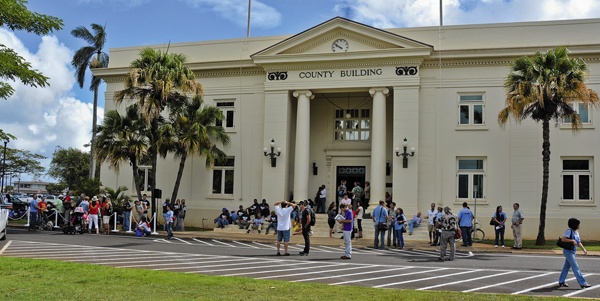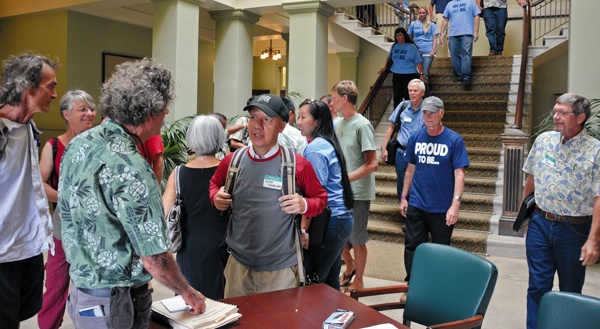LIHUE — After a full day of work Monday, the Kauai County Council unanimously deferred to September a controversial proposal to demand disclosure of pesticide use and genetically modified crops, and to create buffer zones for large agricultural operations.
The council’s Economic Development Committee deferred Bill 2491 to Sept. 9 to wait for an opinion from the attorney general. But Committee Chair Gary Hooser wasn’t set on leaning on it. Past opinions from attorney generals have been reversed, he said.
“There comes a time when we need to step forward and represent the people in the community,” Hooser said.
Councilman Tim Bynum, who introduced the bill with Hooser, said in the long run, opinions from attorney generals and county attorneys “are all opinions” — the responsibility lies with the council.
Despite some opening public testimony asking for a final bill that would please both sides of the issue, what ensued for the remainder of the day was a testimonial to the division that the bill has created on Kauai.
“Bill 2491 in its approach is devastating and fracturing our island — it’s unraveling the fabric of our community,” said local resident Susan Tai Kaneko, a former educator and community-building specialist who works for Syngenta.
“People are insulting and verbally attacking one another, even threatening bodily harm and death,” she said.
Monday marked the first time the council picked up the bill for actual work. The proposal has already gone through a lengthy first reading and an even longer public hearing, where more than 250 pieces of spoken testimony were offered.
After about 20 minutes of public testimony in the morning, the council went into executive session to consult with county attorneys on some legal aspects of the proposal.
Back into the open, the bill was put through the grind by experts and lawyers from both sides of the issue.
“I just wish we could go through this without going to court,” Councilman Mel Rapozo said.
Private attorney Paul Alston, representing biotech company Syngenta, told Councilman Ross Kagawa he could take it as “a given” that the council would be facing lawsuits if the proposal goes through in its current form.
According to Alston and private attorney John Hoshibata, representing Pioneer, existing state laws would pre-empt, or invalidate, a county law to regulate GMOs and pesticide use.
But to Earthjustice attorney Paul Achitoff this would not be the case — state law has neither clear nor intended pre-emptions that would stop the county from passing Bill 2491. With certain safeguards, the county would be able to successfully stand its ground if the case does end up in court, he said.
Based on precedents, the County of Kauai has the authority to say “GMO-free zone,” Achitoff said, but the bill doesn’t even go that far.
Still, to the Syngenta and Pioneer attorneys, even after admitting the pre-emption is not clearly expressed in the state law, the seed companies would emerge successful in the case of a lawsuit.
And contrasting opinions are not uncommon when you put attorneys together in the same room, Bynum said.
“We don’t have a pot of gold to challenge lawsuits,” said Kagawa, adding the people already have the right to know after a state law passed at this year’s Legislature, which resulted in Act 105.
Achitoff, however, said the state law does not say which reports are required to be disclosed, and seed companies can call everything that they don’t want to disclose a “trade secret.”
Rapozo called the set-up a “trial before a trial.”
Councilwoman Nadine Nakamura said she would like to have a legal opinion from the county attorney and from the state attorney general before she would make up her mind. And those opinions could take up to two months to be released, she said.
Once the attorneys left, the council called other experts to testify.
Thomas Matsuda, of the state Department of Agriculture Pesticide Program, said that 9.89 tons of restricted use pesticides are bought annually on Kauai, rather than the 18 tons disclosed by Hooser. The discrepancy, he said, was because the RUPs come diluted in water, so the weight of the active ingredients was less than previously reported.
Glenn Sahara, of the state Department of Agriculture’s pesticide enforcement for outer islands, said that since 2011, there have been 53 inspections with various seed companies, and more than half of these inspections are ongoing. He said the DOA gives priorities to complaints, and some investigations can take up to three years.
Attorney Kyle Smith, one of two attorneys representing Westside residents in a lawsuit against Pioneer, said seed companies here use as much as the highest amounts used by companies on the Mainland — 2 pounds per acre. But because the climate in Hawaii allows for multiple harvests each year, the amount can be multiplied by four. Additionally, pesticides are sprayed about 240 days per year, he said.
Marine biologist Carl Berg said he is contracted by the state Department of Health to test some sites on Kauai, and has found atrazine — a powerful RUP banned in Europe — in Hanamaulu, Nawiliwili and in a number of 26 sites tested.
Some people said atrazine was heavily used by former sugar companies. But Paul Towers, of the Pesticide Action Network, said atrazine has a relatively short life in water and in the soil, so it is likely that the chemical found on Kauai did not come from the sugar plantations.
At about 5 p.m., the council resumed taking public testimony, which lasted almost two hours and, again, showed a sharp divide in the community.
• Léo Azambuja, staff writer, can be reached at 245-0452 or lazambuja@thegardenisland.com





